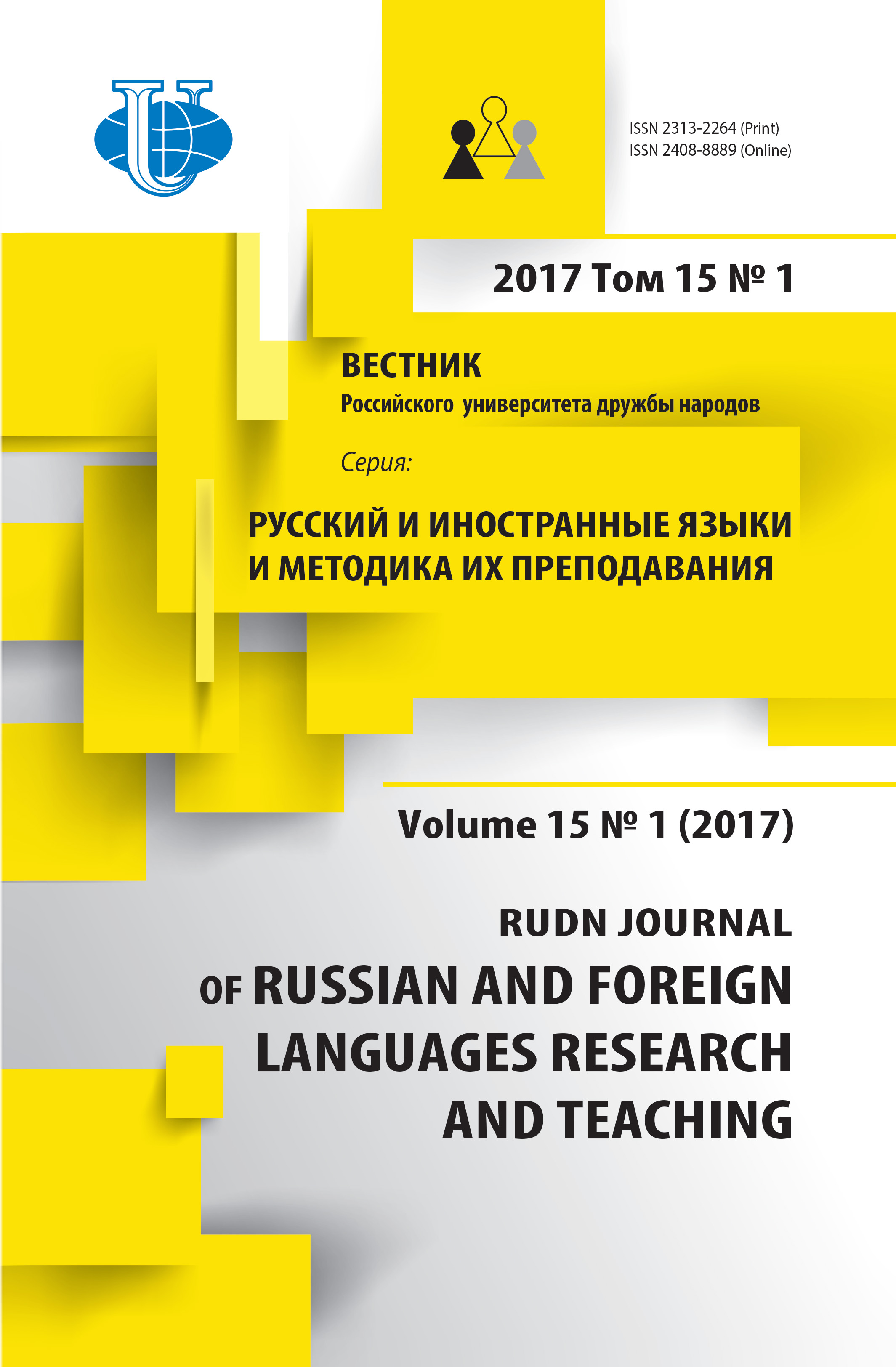NATIONAL AND CULTURAL SPECIFICS OF SOVIET REALITY AND ITS LINGUISTIC REFLECTION IN E.A. EVTUSHENKO’S POETRY
- Authors: Kornakova E.S1
-
Affiliations:
- National Research University “Higher School of Economics”
- Issue: Vol 15, No 1 (2017)
- Pages: 103-112
- Section: Articles
- URL: https://journals.rudn.ru/russian-language-studies/article/view/16033
- DOI: https://doi.org/10.22363/2313-2264-2017-15-1-103-112
- ID: 16033
Cite item
Full Text
Abstract
The article analyzes E.A. Yevtushenko collections of “Utrennij narod”, “Zavtrashnij veter” and the poem “Zima”, which reflected the thorny social issues typical for the Soviet society of the 1970s.The urgency of this article is determined by the following factors: 1) close attention of the modern science to the issues of the conceptual analysis of text; 2) an increased interest in identifying the specifics of World Art Picture of the individual writers; 3) poor attention to the legacy of the poet E.A. Yevtushenko and the lack of the research of this particular theme in his work. The article aims in studying and describingtg the features of verbal and artistic expression of the concept of “citizenship” in the works of E.A. Yevtushenko, to study the structure and the implementation of the verbal concept “citizenship” on the material of artworks E.A. Yevtushenko.The material of this research are poems and prose by E.A. Yevtushenko of different creative periods. These poems and prose are objectifying the analyzed concept. In addition to the disclosure and clarification of the lexical content of the concept of “citizenship” in the system of the Russian language the following lexicographical material was used: “Explanatory Dictionary of Russian Language”V.I. Dahl; Dictionary of Russian language S.I. Ozhegova; Etymological dictionary of Russian Mikhail Vasmer, Dictionary of Russian ed. A.P Evgenyeva, Explanatory Dictionary of Russian ed. D.N. Ushakov and others.The main research method is a special linguistic technique conceptual analysis method that includes the steps of: 1) the vocabulary analysis of lexical paradigm of the word “citizenship”, 2) continuous sample of word lexical items appealing to the concept of “citizenship”, 3) contextual analysis to identify the content of the concept of “citizenship”. Also methods of theoretical research were used: the analysis, synthesis and deductive method (transition from general ideas about the concept “citizenship” to private terminals), a comparison, and also additional methods: descriptive component analysis method, the distribution method of analysis, the solid (from dictionaries) and partial sample material (of texts), word-forming analysis techniques, stylistic and frequency of the statistical characteristics of etymological analysis, a method of continuous sampling, analysis of dictionary definitions, conceptual analysis,comparative-typological analysis and statistical analysis. System-based and text-based approach were used.In conclusion author assumes that the words of the national cultural components play important text-forming role in the works of E.A. Yevtushenko. Identified sovietisms, vernacular elements, dialecticisms and words of the new way of life are the building the blocks of language of E.A. Yevtushenko, displaying a rich artistic world of the poet. Those elements express the way of life of the Soviet people.
About the authors
Ekaterina S Kornakova
National Research University “Higher School of Economics”
Author for correspondence.
Email: ekornakova@hse.ru
graduate student of the Department of General and Russian Linguistics of the Peoples’ Friendship University of Russia, a teacher School of Linguistics, Faculty of Humanities of the National Research University “Higher School of Economics”
Maysnitskaya str., 20, Moscow, Russia, 101000References
- Popova Z.D., Sternin I.A. Problema modelirovanija konceptov v lingvokognitivnyh issledovanijah. Mir cheloveka i mir jazyka: Serija «Konceptual’nye issledovanija». 2003. Vyp. 2. P. 6—16. (In Russ)
- Kubrjakova E.S., Dem’janenko V.Z., Pankrac Ju.G., Luzina L.G. Kratkij slovar’ kognitivnyh terminov. Moscow: MGU, 1997. P. 89. (In Russ)
- Kolesov V.V. Koncept kul’tury: obraz — ponjatie — simvol. Vestnik SPbGU. Ser. 2. 1992. Vyp. 3. P. 30—40. (In Russ)
- Askol’dov S.A. Koncept i slovo. Russkaja slovesnost’. Ot teorii slovesnosti k strukture teksta. Antologija. Moscow: Academia, 1997. P. 267—280. (In Russ)
- Lihachjov D.S. Konceptosfera russkogo jazyka. Izvestija RAN. Ser. lit. i jaz. 1993. № 1. P. 4—10. (In Russ)
- Stepanov Ju.S. Konstanty. Slovar’ russkoj kul’tury. Moscow: Shkola «Jazyki russkoj kul’tury», 2004. 158 p. (In Russ)
- Namitokova R.Ju., Nefljasheva I.A. Slova pojeta: Opyt slovarja avtorskih novoobrazovanij Evgenija Evtushenko. Majkop: Kachestvo, 2009.
- Mihajlova O.S. Idiostil’ E. Evtushenko v aspekte teorii motivacii: avtoref. diss. ... kand. filol. nauk.Tomsk, 2005.
- Slovar’ rifm Evgenija Evtushenko. Tjumen’: Izdvo Ju. Mandriki, 2000. 335 p. (In Russ).
- Petrichenko A.M. Derivacionnaja struktura i stilisticheskie funkcii rechevyh novoobrazovanij v sovremennoj sovetskoj pojezii (na materiale pojezii A. Voznesenskogo i E. Evtushenko)’ [dissertation]. AlmaAta, 1981.
- Chumakova O.M. Pojeticheskie novoobrazovanija E. Evtushenko. Slovoobrazovanie i struktura slova v russkom jazyke. Tashkent: Tashkentskij gos. ped. int, 1980.
- Shahova I.E. Semantikoderivacionnaja struktura individual’noavtorskih imjon sushhestvitel’nyh (na materiale pojezii i prozy Evg. Evtushenko) [dissertation]. Orjol, 1991.
- Sidorov V.Ju. Evgenij Evtushenko: Lichnost’ i tvorchestvo. Moscow: Hudozhestvennaja literatura, 1987. (In Russ)
- Prishhepa V.P. Rossijskogo Otechestva pojet (E.A. Evtushenko: 1965—1995 gg.). Abakan: Izdvo Hakasskogo unta, 1996. Available from: http://www.russofile.ru/articles/article_134.php (In Russ).
- Prishhepa V.P. Paradigma idejnojesteticheskih poiskov E.A. Evtushenko (1949—1998 gg.): avtoref. diss. ... dra filol. nauk. Moscow, 1999. Available from: http://www.russofile.ru/articles/article_133.php (In Russ).
- Mezhirov A.P. Vstupitel’naja stat’ja k knige Evtushenko E.A. «Stihotvorenija i pojemy». Moscow: Molodaja gvardija, 1990. (In Russ).
- Vereshhagin E.M., Kostomarov V.G. Jazyk i kul’tura. Lingvostranovedenie v prepodavanii russkogo jazyka kak inostrannogo. Moscow: Russkij jazyk, 1990. (In Russ).
- Vorob’jov V.V., Sajahova L.G. Russkij jazyk v dialoge kul’tur. Moscow, 2006. (In Russ).
- Evtushenko E.A. Utrennij narod. Moscow: Molodaja gvardija, 1978. (In Russ).
- Evtushenko E.A. Zavtrashnij veter. Moscow: Pravda, 1987. (In Russ).
- Evtushenko E.A. Stancija Zima. Evtushenko E.A. Sobranie sochinenij v 4 t. T. 2. Moscow: Jeksmo, 2014. (In Russ).
Supplementary files














